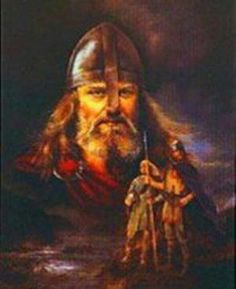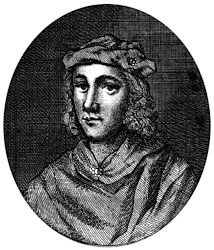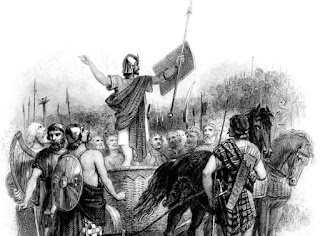King MacBeth
MacBeth
The real story of the man is far from Shakespeare's celebrated version. Indeed, MacBeth's 17-year reign was a prosperous and generous one, and he was to be fondly remembered as the last great Celtic king of Scots.
The single most important fact we know about MacBeth is enshrined in a line borrowed from a Latin poem composed within a generation of his death. It says: "In his time there were productive seasons" - fertile tempus erat. Or, as Andrew Wyntoun, the 15th Century Scottish chronicler put it: "All his tyme was gret plenté/Aboundand baith in land and sé."
Scots in MacBeth's time still believed in vestiges of sacral kingship, which meant that if calamity came upon the land in such disasters as war, famine, pestilence or atrocious weather, the solution was to sacrifice the king. MacBeth could thus have earned no higher praise. According to an Irish poem, he actually radiated the prosperity for which he was so famous - he was 'ruddy-faced, strong, fair, yellow-haired and tall', the 'liberal king' who reigned for 17 bountiful years from 1040 to 1057.
It is beyond expectation that anything remotely resembling a biography can be constructed from the scant materials which survive. Five hundred after MacBeth's death the great humanist, George Buchanan, observed that "some of our writers" related "a number of fables, more adapted for theatrical representation, or Milesian romance, than history" about the king.
For information about his life, we can draw upon a few contemporary ,annals and chronicles including the Orkneyinga Saga which has hitherto been ignored as a repository of information. In addition, we have traditions and information preserved in later chronicles which may have drawn upon earlier materials since destroyed.
Nowadays 'personalities', pop stars and politicians, who are nobodies, have screeds written about them. Here we are dealing with a life reconstituted from a few scribblings in a far-off time about events imperfectly understood by scribes who had little conception of historical causation or motivation and cared even less.
It is known that his name, MacBeathadh, means Son of Life but when his life began is not known. He was the son of Findlaech mac Ruaidri, Mormaer of Moray, who was slaughtered by his nephews in 1020. He was thus a member of the Cenel Loairn, one of three kindreds, or clans, established by the Scots of Dalriada - of which it sometimes held the kingship.
Through time it expanded and migrated through the Great Glen to Moray, a region extending across the Highlands from the Moray Firth to the West Coast. MacBeth thus had an impeccable pedigree and his father held the old Pictish title of mormaer or 'great steward' equating with Old Norse jarl and English 'earl'. In one source Findlaech was called 'king of Alba' which testifies to the status of the House of Moray in this period. Clearly, MacBeth was brought up to believe that he had a claim to the Scottish kingship.
In 1032 one of Findlaech's slayers, Gillacomgain, Mormaer of Moray, was burned to death along with 50 of his men. It may be presumed that MacBeth had a hand in this act of revenge which gained him the coveted title of mormaer, and for good measure, with the intent of strengthening his own claim, he married the deceased's widow, Gruoch. This lady was herself the descendant of earlier kings and as such combined several impressive claims in her own right. It is important to realise that primogeniture, succession by the eldest son, was completely alien to MacBeth's era and culture.
Custom favoured a system of succession which alternated between recognised kindreds while Celtic law demanded the election of a king who was of a sufficiently mature age to lead his people in war and to counsel them in time of peace. There was therefore some unhappy folk in Moray when Malcolm II, after a reign of 30 years, was succeeded by his grandson, Duncan. An entire generation, namely that of MacBeth, had been overlooked, his claims usurped.
After a reign of six years (1034-40) Duncan was killed by his own people' at Pitgaveny near Elgin.
Only one authority states that his slayer was his dux or war-leader, MacBeth. There is a hint that it was Duncan's immaturity or lack of king-like qualities which cost him his life. Indeed, he may have been sacrificed for good reason as, shortly before his death he had unsuccessfully besieged Durham. Five years later Duncan's father and 'nine score fighting men' were also slain in battle. Again it may be inferred that MacBeth was involved but the matter is not certain.
One of Macbeth's half-cousins was Earl Thorfinn the Mighty of Orkney who claimed possession of Caithness and Sutherland and whose ambition knew no bounds. In order to check his aggression MacBeth, as King of Scots, demanded tribute and when it was refused - as he must have known it would be - he attempted to appoint his nephew Moddan as mormaer of Caithness. When, predictably enough, Thorfinn drove Moddan out, MacBeth responded by leading a fleet of 11 ships that caught the Orkney men by surprise off Deerness in the Pentland Firth.
The convention was to lash the ships together so that what was essentially a land battle took place on a floating platform. MacBeth was defeated as he was again, a few months later, at Tarbat Ness. The Orkneyinga Saga, which preserves information on these naval engagements, was understandably concerned to glorify the great deeds of Thorfinn and the men of Orkney. It relates how the Orkney earl went on to conquer a great chunk of Scotland although its veracity is in doubt. The importance of the saga evidence is that it shows MacBeth (confusingly known as Karl Hundason to the sagaman) operating in a northern orbit as he tried to contain the Norse threat, in which endeavor he enjoyed more success than the saga admits.
The year 1050 found MacBeth on pilgrimage to Rome where "he scattered money like seed to the poor". Since the Second Coming had failed to transpire in 1000 AD, the king chose the next best time to visit the Eternal City. Remarkably enough Thorfinn went the same year though whether they travelled together is unknown; possibly one kept a wary eye on the other, each acting as guarantor for mutual good behaviour. Both must have felt confident enough as rulers to leave their respective domains for a considerable period while they undertook the lengthy and hazardous journey. MacBeth was undoubtedly pious by the standards of his age. He and Gruoch, "with the utmost veneration and devotion", granted lands in Fife to the Culdees of Lochleven, while the pilgrimage indicates that he was concerned about the destination of his soul.
Meanwhile, Duncan's son, Malcolm Canmore, was cultivating English support to win back the kingship.
In 1054 Earl Siward of Northumbria marched against MacBeth to fight a great battle; 300 years later the battlesite was named as Dunsinnan in the parish of Collace, Perthshire. This still impressive earthwork provides spectacular views south towards Dundee and Fife, north across Strathmore to the Grampians and west to the Dunkeld gorge. Today it is not even signposted, perhaps out of deference to the king who was forced to retreat defeat over the Grampians. Three years later he made his last stand at Lumphanan, Aberdeenshire, where "Malcolm cut him off by a cruel death".
Thus the few bare facts about one man's life, more of defeat than glory perhaps, but his prosperous reign was a cause for celebration and in later years he would be remembered as the last great Celtic king of Scots from whom many clans were proud to trace their descent. In the eyes of some he was also the last king uncontaminated by English influence yet the first recorded Normans in Scottish history fought on his side at Dunsinnan.
History, however, is written by the victors and by the 14th century stories designed to blacken MacBeth's name which were in circulation probably derived from bardic marched against MacBeth to fight a great battle; 300 years later the battlesite was named as Dunsinnan in the parish of Collace, Perthshire. This still impressive earthwork provides spectacular views south towards Dundee and Fife, north across Strathmore to the Grampians and west to the Dunkeld gorge. Today it is not even signposted, perhaps out of deference to the king who was forced to retreat defeat over the Grampians. Three years later he made his last stand at Lumphanan, Aberdeenshire, where "Malcolm cut him off by a cruel death".
Thus the few bare facts about one man's life, more of defeat than glory perhaps, but his prosperous reign was a cause for celebration and in later years he would be remembered as the last great Celtic king of Scots from whom many clans were proud to trace their descent. In the eyes of some he was also the last king uncontaminated by English influence yet the first recorded Normans in Scottish history fought on his side at Dunsinnan.
History, however, is written by the victors and by the 14th century stories designed to blacken MacBeth's name which was in circulation probably derived from bardic propaganda soon after his death.
Fordun's Chronicle depicts him as a murderer and wicked tyrant who drove the sons of the popular and easy-going Duncan out of Scotland along with the loyal MacDuff, Thane of Fife, who was nowhere mentioned in earlier sources. Wyntoun, writing about 1420, greatly embroidered the legend but also preserved rival traditions which must have originated among MacBeth supporters.
It is Wyntoun who first relates the story of the three prophetic witches, who asserts that MacBeth was fathered by none other than the Devil who predicted that no man born of woman would have the power to take his life, who wrote of the marching woods of Birnam and who recorded the battle of Dunsinnan.
He also noted, however, that Malcolm Canmore was the illegitimate son of Duncan by his "lewd" and low-born mistress, the daughter of the miller of Forteviot.
The men of Moray remained a threat to the Scottish monarchy for some 200 years, an ample period for the growth of MacBeth's unflattering legend. Yet the best efforts of the chroniclers and later historians could not quite obliterate the liberal king of the prosperous seasons. That task would be left to the scribbler of Stratford whose literary genius ensured the virtual eclipse of history, but who paradoxically immortalised the man.
Three years after MacBeth's disastrous defeat at the battle of Dunsinnan, he makes his last appearance in the chronicles as a fugitive, hunted down and killed by Malcolm Canmore in a skirmish in a remote woodland west of Aberdeen.
First details of MacBeth's death are given by John of Fordun in his Scotichronichon, compiled in the late 14th century.
Around 1057, MacBeth was seeing his own forces being diminished daily while those of his adversaries were increasing. He took flight from the southern parts of his kingdom and went to the north, in whose narrow passes and deep woods he hoped to find safety.
MacBeth probably intended to raise a force in his former Mormaerdom of Moray, where his people were still loyal. quickly followed him across the mountains, and a running engagement then ensued. This drove MacBeth into the tiny woodland of Lumphanan, whose western approaches then comprised dense marshes and a wide shallow loch.
In local traditions, MacBeth was surprised by an attack from Malcolm's men on Queen's Hill near Aboyne, drank from a nearby well during the pursuit, and turned at bay at the Peel of Lumphanan, under whose defensive earthworks, he received his death-wound. Some say he was slain while leading a charge of his bodyguard.
MacBeth's severed head was brought to the triumphant Malcolm - on a pole according to some, on a golden platter according to others.
MacBeth has become associated with a number of features in and around the place of his death. Visitors can find the well, and the Peel of Lumphanan, a medieval motte surrounded by a moat, along with 'MacBeth's stone' believed to mark the site of his death, as well as "MacBeth's cairn". Latterly he has even been commemorated by a hotel, the MacBeth Arms (formerly the Lumphanan Hotel).
MacBeth's death at Lumphanen can, in retrospect, be seen as one of the turning points in Scottish history. The gradual replacement of Celtic society by Anglo Norman ways under MacBeth's successors had its origin in a violent clash of arms in the dark woods of Lumphanan.











Excellent read/listen 👏👏👏
ReplyDelete